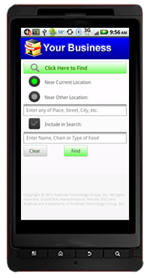Sunday
Dec022012
HTML5 vs. Native App Development
 As you're likely aware, there's a big debate going on about whether HTML5 web sites are a better platform for mobile apps than native code development using Android, iOS and Windows.
As you're likely aware, there's a big debate going on about whether HTML5 web sites are a better platform for mobile apps than native code development using Android, iOS and Windows.The main selling point for HTML5 is the write-once-run-anywhere advantage. Web browsers on mobile devices can access web sites from any mobile platform. HTML5 is providing features that allow web page JavaScript code to access phone features like devices sensors and geo positioning. In theory, a well constructed HTML5 web page will look and perform like a mobile device native code app.
However, currently not all device features are available to HTML5 JavaScript code and native code apps have a performance advantage over HTML5 web pages viewed using a browser. Native code apps are presently the dominant choice among developers.
In HTML5's corner, though, the technology is improving and web browsers are ramping up their implementation of HTML5 features. Life would certainly be simpler for mobile developers if they could develop for only one platform, HTML5, instead of multiple native platforms.
Longer term, HTML5 will certainly continue to get better. But so will native platforms. In fact, native platforms may improve more rapidly than HTML5. HTML5 is a global standard developed by the W3C. It takes years of effort to change the standard and have these changes adopted by the various browsers. The individual native platforms (Android, iOS, Windows) can change as quickly as their developers (Google, Apple and Microsoft) want them to. So will HTML5 ever catch up?
Maybe not. Google, Apple and Microsoft have lots of developers and big budgets. They want their products to be competitive ... and that means constant improvements.
So, what's likely to happen? In my opinion, we'll have a blend of the two. In fact, this is taking place today. Native code platforms have Application Programming Interfaces (APIs) that support displaying web pages from within native code apps. Developers can use native code for what it does best and HTML5 web pages for what they do best. The exact mix will shift over time as all the platforms change and improve.
For developers, this means that separate native code platforms will likely continue to exist. Write-once-run-anywhere will remain an elusive goal probably not realized for a long time, if ever. This doesn't mean that development costs can't be managed or reduced. HTML5 web pages can be developed and used by native code apps where appropriate. Functions specific to those pages can be write-once-run-anywhere. This may not be an optimal solution, but it's the game on the ground.


























 Don Cowan
Don Cowan
Reader Comments (2)
HTML5 will dominate othe app development styles. It has got plenty of varity in its development and it is very dynamic too.......
An instructive post. People to really know who they want to reach and why or else, they'll have no way to know what they're trying to achieve. People need to hear this and have it drilled in their brains..
Thanks for sharing this great article.
Wish to Get a visit on canadian web design for more latest tips and news.